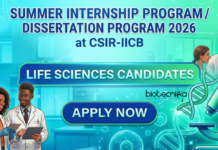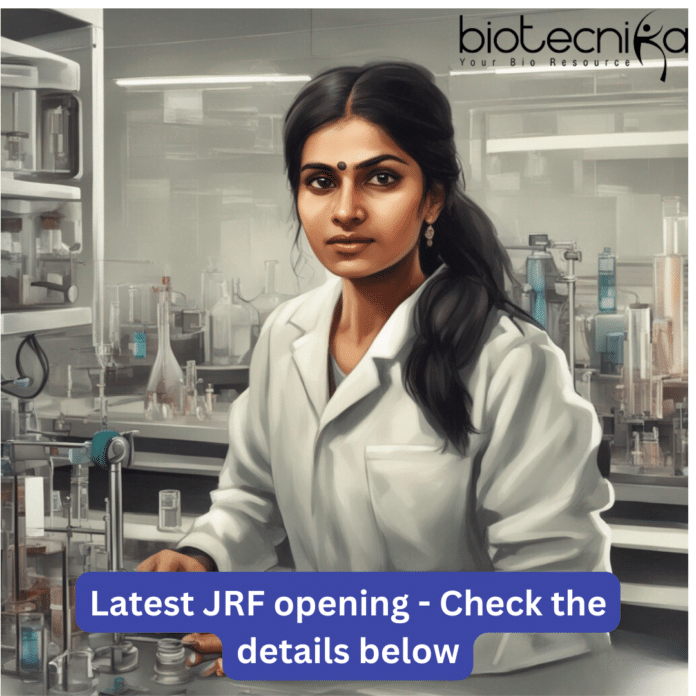GBU JRF Post For MSc Biotech, Microbiology & Biochem – Applications Invited
GBU JRF Post For MSc Biotech, Microbiology & Biochem – Applications Invited. MSc Biotech, Microbiology & Biochem junior research fellow job opening. Interested and eligible applicants can check out all of the details on the same below:
This job expires in
GUJARAT BIOTECHNOLOGY UNIVERSITY
Near Gujarat International Finance Tec-City,
Gandhinagar, Gujarat 382355
Applications are invited for the post of Junior Research Fellow (JRF) to work on research project entitled “Wastewater to biofuel and bioproducts: Cyanobacterial biorefinery through a green circular bioeconomy” funded by Gujarat State Biotechnology Mission, Govt. of Gujarat at Gujarat Biotechnology University (GBU). The post is purely temporary and co-terminates with the project. You can find the details of the Latest MSc Biotech Job below. Apply online.
Post – Junior Research Fellow (JRF) (No. of Positions: 01)
Age Limit – Up to 30 years on closing date of advertisement
Fellowship Duration – Till the end of the project: 2 years (subject to satisfactory performance)
Fellowship – Rs. 36, 000 per month inclusive of HRA (NET/GATE or national-level exam
qualified candidates) as per GSBTM, DST, GoG guidelines.
OR
Rs. 23, 213 (fixed) per month (For candidates who have not qualified the national-level examinations such as NET/GATE) as per GSBTM, DST, GoG guidelines.
Last Date of receiving applications – 18/09/2023
How to Apply:
- Eligible candidates may apply to the Principal Investigator (Dr. Chirayu Desai), Gujarat Biotechnology University, Gandhinagar through online application at (https://io.gbu.edu.in/biofuel) with latest CV and other credentials on or before 18th September 2023. For any queries related to this project you may write to ebt-[email protected].
- Shortlisted candidates will be informed through email regarding the interview process.
Eligibility for Latest MSc Biotech Job –
Minimum Qualifications:
M.Sc. (Biotechnology/Microbiology/Biochemistry or relevant life science discipline) with minimum of 55% marks.
Desirable Qualification:
- Candidates who have qualified the CSIR-UGC-NET/DBT-JRF/ICMRJRF/GATE etc. national-level exams will be preferred.
- Candidates having prior experience of handling cyanobacteria/microalgae cultivation and characterization, microbial consortia development, cyanobacterial lipid extraction and protein purification, wastewater treatment, metagenomics, molecular biology techniques and detection of emerging contaminants in water through LC-MS/GC-MS are encouraged to apply.
- Candidates must have proficiency in scientific writing
Check the notification below
Greetings, everyone! We’ve put together a comprehensive set of interview questions and well-crafted answers to assist you in your interview preparation for Latest MSc Biotech Job. These valuable resources are designed to enhance your self-assurance and enable you to excel during your upcoming interviews. Wishing you the very best of luck!
Tell us about your educational background and how it aligns with the requirements for this JRF position in terms of qualifications and specialization.
Answer: I hold a Master’s degree in Biotechnology with a specialization in Microbiology. My academic record reflects a consistent performance, with over 55% marks. This educational background aligns well with the minimum qualifications required for this position, making me well-equipped to contribute to the research objectives of the project.
Have you qualified for any national-level exams such as NET/GATE, and if so, how does that certification enhance your suitability for this role?
Answer: Yes, I have successfully cleared the CSIR-UGC-NET examination. This achievement demonstrates my strong grasp of the subject matter and research aptitude. It also signifies my commitment to pursuing a research-oriented career, which is directly relevant to the responsibilities of a Junior Research Fellow in this project.
Could you describe any previous experience you have in handling cyanobacteria, microalgae cultivation, or related tasks mentioned in the job description?
Answer: I have substantial experience in working with cyanobacteria and microalgae in various research projects during my academic journey. This includes their cultivation, characterization, and lipid extraction. Additionally, I have contributed to microbial consortia development and wastewater treatment studies, all of which are directly relevant to the goals of this project.
How do you plan to contribute to the research objectives of this project, and what skills or expertise do you bring that will aid in its successful execution?
Answer: I intend to leverage my knowledge of cyanobacteria and microalgae, coupled with my experience in molecular biology techniques and emerging contaminants detection through LC-MS/GC-MS. My proficiency in scientific writing will also be valuable for documenting and publishing our findings, ensuring the project’s success and dissemination of knowledge.
Can you provide an example of a scientific project you’ve worked on where you faced a significant challenge and how you overcame it?
Answer: In a previous project focused on wastewater treatment using microbial consortia, we encountered a challenge with the stability of the consortium over time. Through diligent monitoring and adjustments to the culturing conditions, we were able to enhance the stability and performance of the consortium, ultimately achieving our research goals. This experience taught me the importance of adaptability and perseverance in research, skills I’ll bring to this project.
Editor’s Note: GBU JRF Post For MSc Biotech, Microbiology & Biochem – Applications Invited. Please ensure you are subscribed to the Biotecnika Times Newsletter and our YouTube channel to be notified of the latest industry news. Follow us on social media like Twitter, Telegram, Facebook


























